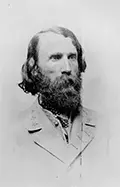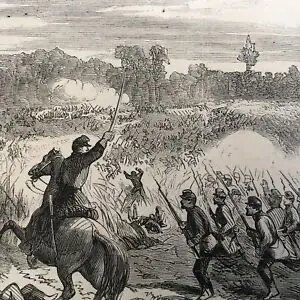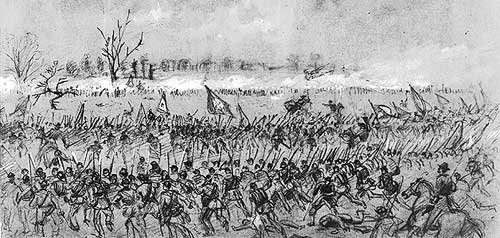Confederate General A.P. Hill
A.P. Hill was a Confederate general in the American Civil War. An aggressive commander, he found great success on the battlefield. He also died there. 
He was born Ambrose Powell Hill on Nov. 9, 1825, at Greenland, the plantation that his father ran near Culpeper, Va. He enrolled in the U.S. Military Academy in 1842 and finished five years later, one more than the usual track because he suffered illness. He joined the 1st U.S. Artillery in fighting in the Mexican-American War. After that war, Hill served on coastal survey outfits and fought in the Third Seminole War. He married Kitty Morgan McClung in 1859. They had two children. Hill gained an appointment as colonel of the 13th Virginia Infantry in March 1861. He and his regiment were present at the First Battle of Bull Run/Manassas but were part of the reserves and so did not see combat. His first fighting took place at the Battle of Williamsburg, during the Confederate troops' defense against the Union's Peninsula Campaign. He won promotion to the rank of brigadier general. 
A strong personality, Hill had a habit of clashing with his superior officers. He and James Longstreet had a falling out after the Battle of the 7 Days, and then Hill and Stonewall Jackson did not see eye-to-eye. (Hill was at one time under arrest for neglect of duty.) On the battlefield, however, Hill showed his mettle, first at Cedar Mountain, then at the Second Battle of Bull Run/Manassas, and then, specifically, at Antietam/Sharpsburg, rescuing the Army of Northern Virginia from what early in the battle on looked like a Union route. Hill was with Jackson at Harpers Ferry and then embarked his regiment on a forced march that got them there in the middle of the Sharpsburg battle, in time to make a difference. Hill was one of the few commanders who suffered any sort of setback at the Battle of Fredericksburg, in an otherwise convincing Confederate route. In the next major battle, at Chancellorsville, Hill was part of the Confederate success, helping convince the numerically superior Army of the Potomac to leave the battlefield. Hill was wounded at this battle; quickly recovering, he gained a promotion to the rank of lieutenant general and also gained command of an army corps. Hill and his corps were the ones who stumbled into what became the iconic Battle of Gettysburg. On June 30, a brigade of Hill's corps traveled the eight miles east from Cashtown to Gettysburg in order to get supplies. (One story is that they were in search of new shoes, of which many soldiers would have had great need.) The Confederate troops discovered a Union cavalry force under Brig. Gen. John Buford; neither side was looking for a fight at that time, so both withdrew. Buford's force was an advance force of the larger Union army, which Hill discovered when he sent an attack force numbering brigades the next day. Foreshadowing things to come, That occupation of the high ground proved to be a huge advantage for the Union troops. Hill and his men were part of a large-scale attack on the second day of the battle and then took part in the fabled "Pickett's Charge" the following day. A battered and exhausted Confederate army retreated from Gettysburg and left the North entirely. Hill suffered a strong defeat at the Battle of Bristoe Station, on October 14, as his preference for speedy attack got the better of him and his troops. One of his fellow general, Carnot Posey, suffered a mortal wound during the battle. Hill's Third Corps held their ground in the face of fierce attacks from Union troops at the Wilderness and then fought at the next battle, at Spotsylvania Court House. Hill himself did not fight in that battle, having suffered illness that kept him out of the fray. He was back in action at North Anna River and Cold Harbor, but illness again claimed his activity during the long Siege of Petersburg. On April 2, 1865, Union commander Ulysses S. Grant ordered a mass assault on the Confederate line. Union troops made the kind of progress that they had hoped to make many months earlier, forcing the defenders back to the inner ring of fortifications. While riding between the lines to encourage the defenders, Hill fell to Union bullets. He was 39. |
|
Social Studies for Kids
copyright 2002–2024
David White



 Buford's troops set up defense lines on three ridges west of town. The idea was to delay the Confederate advance until the full Union army arrived. With superior firepower, the Confederate troops dislodged the defenders and seized control of the town and of two of the three ridges. (An advance force of Union infantry arrived toward the end of the day, but it was not enough to repulse the Confederate advance.) Late in the day, Union forces formed a defensive position on Cemetery Hill. Seeing this, Lee ordered Ewell's forces to take the hill "if practicable." Ewell, deciding that the cost would be great, did not press the attack. At the end of the first day, Union troops were ensconced on the high ground.
Buford's troops set up defense lines on three ridges west of town. The idea was to delay the Confederate advance until the full Union army arrived. With superior firepower, the Confederate troops dislodged the defenders and seized control of the town and of two of the three ridges. (An advance force of Union infantry arrived toward the end of the day, but it was not enough to repulse the Confederate advance.) Late in the day, Union forces formed a defensive position on Cemetery Hill. Seeing this, Lee ordered Ewell's forces to take the hill "if practicable." Ewell, deciding that the cost would be great, did not press the attack. At the end of the first day, Union troops were ensconced on the high ground.

